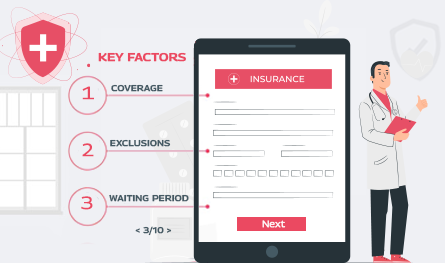Related Articles
 Jan 08, 2025
Jan 08, 2025
Is Varicose Vein surgery covered under the health insurance policy in India
 Health Insurance
Health Insurance

With the increasing cost of healthcare, you must think hard and invest in a health insurance product that can protect you and your loved ones from unforeseen medical emergencies. However, one small slip while buying health insurance may cost you heavily.

So, while you go hunting for the best plan that suits you, consider that the plan you choose ticks these crucial pointers listed below:
Consider which stage of life you are in before you decide on an insurance plan. If you are starting a new family a comprehensive plan with a family floater having an entry age as low as 91 days would be apt for you. If you want coverage for chronic or lifestyle diseases, you should look for a plan with pre and post-hospitalisation coverage. If you are buying health insurance coverage for your parents or even grandparents, separate plans for senior citizens would be a better way to go.
It is just a habit to go for a cheaper premium at the first instinct. But not at the cost of the insurance coverage. If you happen to find all required coverages at a cheaper premium, do go for it. But always delve deeper to find out why the cost of coverage is low. There may be additional charges for extra coverages in the form of riders and clauses of co-payments, deductibles and ceilings on coverage payments for specific diseases.
You should go for a balanced plan which provides you with wholesome coverage at an affordable cost rather than blindly going for some cheaper premiums. It may so happen that you end up paying more at the time of the actual claim. Ensure that the sum insured can cover your family size, your city’s healthcare costs and any pre-existing health conditions.
Certain pre-existing conditions are covered by health insurers after a wait time which usually ranges from 2 to 4 years, post which you are eligible for a payout of the insured amount. Medical conditions like high blood pressure, diabetes, thyroid, and hypertension are usually covered with a waiting period. The tenure though varies from insurer to insurer and some may offer a lower waiting period. So be sure to look out for the list of such diseases covered, the tenure of the waiting period and options for buyout which lets you reduce the wait time.
Most health insurance providers offer no claim benefits in the form of bonuses and renewal discounts. The no-claim bonus gets added at the year-end if you do not file a claim within the policy year. This way your sum insured is increased for the next year. Some policies even retain no-claim bonus facilities after a minor claim. Some even offer cumulative bonuses for consecutive claim-free years.
For instance, if the sum insured of a policy is 5 lakhs and the company declares an NCB of 10 % for every claim-free year with a maximum of 50%, Rs.50000 will get added to your sum insured every year till it reaches the amount of Rs. 7,50,000 (which is 50% of initial sum insured of 500,000/- =2,50,000/-+ Sum Insured of 500,000/-).
Would you not be relieved if someone could take care of your finances while you focus on your or your loved one’s recovery during medical exigencies? A cashless benefit is just what you need. Every health insurance company has a list of hospitals with whom they have tie-ups for direct payments. It saves you from the arduous paperwork required for hospital admission and claim. Moreover, you have access to the best doctors and facilities without sweating about your expenses. Hence checking the list of hospitals along with the process to access cashless benefits while buying health insurance can save you a lot of stress.
Standard and regular health plans may not cover terminal illnesses like cancer, cerebral strokes, or kidney diseases. To have enhanced coverage for these long-term diseases, you should consider policies with additional critical illness riders.
Added to these, there may also be accidental disability cover, hospital cash benefits or personal accident insurance.
Nowadays health checkups may also eat into your savings as they need to be regular and are quite expensive due to the usage of modern technologies. Regular MRIs, Ultrasonograms, screenings, ECGs and EEGs are sure to pinch your pockets hard. Look for this preventive coverage when you are buying health insurance plans for your family.
The co-payment clause simply means the amount that you will need to contribute at the time of claim, and the restof the amount will be reimbursed by your insurer. In case you want a plan without a co-payment clause buy a plan without sub-limits.
Preparing yourself in advance for maternity expenses will be a good piece of wise advice to consider. Usually, maternity benefits have a waiting period of 2-4 years, so you should plan in advance when you decide to start a family. You should go for plans that have coverage for newborn babies along with normal and C-section deliveries without charging extra premiums.
When you are admitted for treatments, it is not only those days that your expenses soar but also before and after them, you continue to pay for multiple other activities associated with your recovery. Repeated medical tests, doctor consultations, post-operative care at home, medicines, physiotherapies etc. are to name a few. Ensure your health care plan is well-equipped to cover them without you being worried about finances.
This is a very crucial point to consider as it will be a blessing at the time of settling health claims. No one wants to be hassled about money when your near and dear ones are suffering in a hospital. Hence do check client reviews, choose a reputed brand as your provider and read about their claim settlement process in detail before going all in.
Young and healthy? Find out which of these plans rewards you with lower premiums. Click here to check now!

Paybima Team
Paybima is an Indian insurance aggregator on a mission to make insurance simple for people. Paybima is the Digital arm of the already established and trusted Mahindra Insurance Brokers Ltd., a reputed name in the insurance broking industry with 21 years of experience. Paybima promises you the easy-to-access online platform to buy insurance policies, and also extend their unrelented assistance with all your policy related queries and services.

.jpg)
Having a bike is not just about convenience, it’s a huge responsibility. Financial protection of your two-wheeler is important and the best way to ensure that is to have a bike insurance policy that will protect you in case of an accident, theft or a natural calamity. There are so many options when it comes to policies, making it difficult to know what’s best. This guide makes it easier to choose the best bike insurance policy that is suitable for you.


Non-linked, non-participating term plans are the ones that do not participate in the business and profit of the insurance company. These are fixed premium plans where the policyholder pays a fixed amount to ascertain a guaranteed sum as a return to be paid to the nominee in case of his/ her demise. Let’s learn more in this post.


Car depreciation implies the difference between the cost of a car at the time of buying the car and when you sell it. A car insurance claim amount is determined by the car depreciation rate. The car depreciation rate is the reduction in the value of your car over its lifespan caused by wear and tear.


Have you ever caught yourself lost in illusions about your daughter's future events, such as her university convocation and first day at work? Her university convocation. When she embarks upon her initial job after graduation will be the day.

.png)
Accidents can happen anywhere, anytime, by your own fault or another person. What’s important is to be prepared for such mishaps. This is where Own Damage Car Insurance comes in handy.
